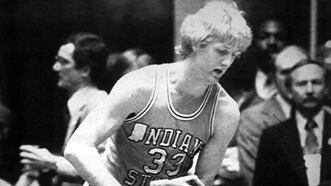Plus: Check out March Madness for news, previews and all your NCAA Tournament action.

The narrative was set. This was not a championship game between Michigan State and Indiana State. This was Magic against Bird, the best big-man matchup in an NCAA final since Bill Russell led the University of San Francisco to a win over Tom Gola’s LaSalle University in 1955. A flurry of headlines characterized it that way: “Bring on Bird” (State Journal); “Bird takes on the Magic Man” (Dallas Morning News); “Brace yourselves for the matchup: Bird vs. ‘Magic’ ” (Louisville Courier-Journal). “These mano-a-mano things always appeal to sports fans,” says Don Ohlmeyer, the former president of NBC Sports. “Magic and Bird were such attractive characters. I think it just captured people’s imaginations.”
Before the game, he told Johnson this game was the opportunity of a lifetime. “You bet it is,” Magic said, “and when we win this game, remember that.”
Before Johnson and Bird left the Hilton, they briefly sat together for photographers. The occasion marked the first time the two of them had been photographed just by themselves. One picture was transmitted across the Associated Press wire, enabling it to be published in almost every sports section in America on Monday morning. It was a striking image: Magic’s smile beamed from ear to ear, as if there were nowhere on earth he’d rather be. Larry leaned toward Magic awkwardly and proffered half a smile. They were both big men who were skilled passers and steadfast competitors. They both even wore the number 33. Yet that photograph told the broader story, quite literally in black and white: For all of their similarities, these two guys could not have been more different.
***
NBC was certainly ready. As per Don Ohlmeyer’s instructions, Don McGuire had put together a pregame package on Magic and Bird, as well as a highlight reel that was going to run at halftime under the soundtrack to the song “Magic to Do” from the Broadway musical Pippin. To put together those segments, McGuire watched hours and hours of footage from the entire season. At that point, he had seen more of both Magic and Bird than anybody on the planet. “It was like looking at a great piece of art. Just play after play, and it wasn’t just shooting. It was passing and dribbling,” McGuire says. “The beauty of the way these guys played really captivated people. We just hadn’t seen anything like it before.”
***

Both teams conducted their standard game-day shootarounds on Monday, March 26, but as the hours passed before they headed over to the arena, [Michigan State’s Greg] Kelser developed a severe case of the butterflies. “The time was just going by so slowly. It was a snail’s pace,” he says. “You know where you are, what you’re trying to accomplish as a group, and you’re almost there. With every passing half-hour, the nerves would just grow and grow. I think some nervousness is always good before a game, but this was quite unusual, so much so that I wondered if nature would take over and eventually quell itself.”
Kelser didn’t tell anyone how he was feeling, but Darwin Payton sensed the players were wound pretty tight. In his final pregame meeting of the season with [coach Jud] Heathcote in the coach’s hotel room, the student manager encouraged Heathcote to give his guys a chance to settle down once the game began. “The guys are more prepared and more up for this game than any game we’ve ever played,” Payton told him. “If you could just be easier on them in the beginning of the game and allow them to play, they’ll be ready.”
If Magic was feeling as nervous as Kelser was, he did an excellent job of hiding it. “I just remember in warm-ups, he was incredibly confident,” Mike Longaker says. Before the game, he told Johnson this game was the opportunity of a lifetime. “You bet it is,” Magic said, “and when we win this game, remember that.”
In the other locker room, Larry Bird was not projecting the same type of swagger. “Larry told me this was going to be our toughest game of the year,” Brad Miley says. “He thought we could win, there’s no doubt, but he knew we had met a team that gave us the biggest matchup problems.”
Moreover, the grind of the season, the tournament, and the weekend appeared to be taking their toll on Bird. As he and Bob Heaton were sitting on tables in the Indiana State training room getting their ankles taped by Bob Behnke and Rick Shaw, Bird turned to Heaton and asked, “You ready?”
“Yeah,” Heaton said.
Bird replied, “I hope so, cuz, ’cause I ain’t feeling it.”
Heaton didn’t think much of the comment, but Shaw was taken aback. “You better be feeling it, man,” he said. “This is what we’ve been playing for.” But Bird said nothing.
“That statement has stuck with me for all these years,” Behnke says. “You don’t think of Larry as sophisticated, but in a basketball sense he was. Larry had an insight about Michigan State that none of our guys did. I think he knew better than anyone else what we were getting into.”
Excerpted from WHEN MARCH WENT MAD: The Game That Transformed Basketball by Seth Davis, published this month by Times Books, an imprint of Henry Holt and Company, LLC. Copyright © 2009 by Seth Davis. All rights reserved.
Seth Davis is an on-air studio analyst for CBS Sports coverage of NCAA basketball and is an on-air host, reporter, and analyst for the College Sports Television cable network. He is also a staff writer at Sports Illustrated, where he has worked since 1995, primarily covering college basketball and golf. A graduate of Duke University, Davis lives with his family in Ridgefield, Connecticut.






